Insurance Providers
Discover the wide range of insurance providers we partner with.
Explore MoreCleveland Clinic Abu Dhabi’s Cancer Institute provides world-class care to patients. We offer the very latest diagnostic and treatment options for a wide range of cancers, close to home.
Meet Our TeamStart your cancer treatment journey with access to world-class oncologists.
We know that a cancer diagnosis for you or a loved one can be a life-changing event.
Cleveland Clinic Abu Dhabi offers an integrated and transformative approach to diagnosing and treating cancer. With multidisciplinary expertise and specialized treatment, we provide you with the most appropriate and compassionate care you need, close to home.

The Breast Health & Cancer Program at Cleveland Clinic Abu Dhabi provides access to a full range of breast health services, all in one place. Our multidisciplinary team of specialists offer breast surgery, breast medical oncology, and reconstruction, as well as cutting-edge therapeutic and surgical breast cancer treatments. Reconstruction is an important part of the journey, and we continue to care for patients long after their mastectomy performing additional procedures when needed.
Our Program also features a dedicated Breast Imaging Suite, with our all-female multidisciplinary team performing screening, investigative and diagnostic services, using the latest state-of-the-art equipment, in a completely private and compassionate environment.
Learn More
The multidisciplinary team at Cleveland Clinic Abu Dhabi’s Eye Cancer Program offers state of the art diagnostic and treatment options for a range of complex eye conditions and disorders, including tumors of the eye.
Tumors of the eye and surrounding area are caused by abnormal cells that have begun to divide and multiply in an abnormal way. Symptoms depend on the tumor’s location and generally, treatment involves surgery, radiation, and/or chemotherapy, as well as specialized procedures like thermotherapy or brachytherapy for local ophthalmic treatment.
Experience in the diagnosis of eye tumors and an understanding of how to treat them is key to achieving the best possible outcome.

The Intraocular Melanoma Program at Cleveland Clinic Abu Dhabi provides specialized care and support for people diagnosed with Intraocular Melanoma. Intraocular melanoma is the most common form of eye cancer in adults. It affects the uvea (the middle part of the eye). It can lead to vision loss and changes in eye color or shape. Intraocular melanoma can spread to other parts of the body, particularly the liver. Treatments include surgery and radiation therapy. Experience in the diagnosis of eye cancers, and an understanding of how to treat them, is key to receiving the best possible outcome.
Learn More
The Orbital Tumors Program at Cleveland Clinic Abu Dhabi provides specialized care and support for people diagnosed with Orbital Tumors. Our team are highly trained in the structure and function of the eye, and our ophthalmologists and optometrists offer state of the art diagnostic and treatment options for a range of complex eye conditions, including Orbital Tumors.
Orbital tumors are abnormal tissue growths in the structures surrounding the eye. Through a multidisciplinary approach with the experienced Cleveland Clinic Abu Dhabi cancer team, you'll receive expert care for your vision.

The Endocrine Cancer Program at Cleveland Clinic Abu Dhabi provides highly specialized treatment for diseases of the thyroid, parathyroid, and adrenal glands.
Endocrine cancer surgery is a specialized field which combines endocrinology, surgery and oncology. Our experts work closely with Cleveland Clinic Abu Dhabi’s medical endocrinologists in the Medical Subspecialties Institute and perform a large number of endocrine surgeries each year.

The Thyroid Cancer Program at Cleveland Clinic Abu Dhabi’s Cancer Center provides specialized treatment for thyroid cancers.
Thyroid cancer surgery is a highly specialized field that combines endocrinology, surgery and oncology. Our expert thyroid surgeons work closely with Cleveland Clinic Abu Dhabi’s endocrinologists in the Medical Subspecialties Institute and perform many thyroid surgeries each year.

The Gastrointestinal Cancer Program at Cleveland Clinic Abu Dhabi’s Digestive Disease Institute is led by a team of physicians and staff experienced in the most cutting-edge techniques for the diagnosis and treatment of gastrointestinal cancers.
The gastrointestinal cancer team uses a multidisciplinary approach to create an individualized plan for each patient that includes diagnosis, treatment, and follow-up care. Gastrointestinal cancers, including caner of the esophagus, stomach, duodenum and small intestine, are some of the most complex cancers and for that reason, are often difficult to treat.

The multidisciplinary Colorectal Cancer Program at Cleveland Clinic Abu Dhabi provides state-of-the-art, compassionate, and culturally sensitive care for patients with colorectal cancer in the region.
Colorectal cancer is one of the most common cancers in the UAE in both women and men. Affecting the colon or rectum, it is also known as bowel, colon or rectal cancer. It usually affects people over the age of 40, however the number of cases has increased over the last decade according to the Department of Health, particularly among younger age groups.
Screening tests can detect colorectal cancer early and can increase chances of successful treatment and survival. Regular screening can also reduce your risk of developing colorectal cancer altogether.

The Esophageal and Stomach Cancer Program at Cleveland Clinic Abu Dhabi brings together a multidisciplinary team of gastroenterologists, oncologists and surgeons. Using the most sophisticated diagnostic tests, our team works together to provide an individualized care plan for each patient. Esophageal and stomach cancer can affect swallowing and therefore impact quality of life. Therefore, we work alongside a team of supportive services, including nurses, pain management specialists, social workers and dieticians.
Learn More

The Liver Cancer Program at Cleveland Clinic Abu Dhabi offers state-of-the-art facilities and medical care to patients with liver cancer, through a multidisciplinary team of experienced health care professionals, who are leaders in the field of hepatic oncology. Using the most sophisticated diagnostic testing and imaging, and with advanced endoscopic and interventional radiology support, and the latest robotic and minimally invasive surgical options, our team work together to provide an individualized care plan for each patient.
For patients who require a transplant following cancer, Cleveland Clinic Abu Dhabi’s Transplant Center offers local, trusted and experienced care. As the UAE’s first and only multi-organ transplant center, our facility performs cutting-edge, life-changing surgeries. Patients receive compassionate care and extended support and counseling to ensure the most successful medical outcome is achieved.
Learn More
The Pancreatic and Biliary Cancer Program at Cleveland Clinic Abu Dhabi offers state-of-the-art facilities and medical care to patients diagnosed with pancreatic or bile duct cancer and other pancreatic diseases. Using the most sophisticated diagnostic testing and imaging, and with advanced endoscopic and interventional radiology support, and the latest robotic and minimally invasive surgical options, our team work together to provide a care plan that is individualized for each patient.
Pancreatic diseases and related disorders are on the rise in the Middle East. Pancreatic cancer is a disease which starts in the ductal cells of the pancreas and forms a cancerous tumor. In addition to cancer, there also are many types of benign (non-cancerous) tumors that can develop. Symptoms of pancreatic cancer do not usually present until the disease is advanced when unfortunately, treatment options are limited. Biliary or bile duct cancer is a rare disease in which cancerous cells form in the bile ducts.

The Genitourinary Cancer Program at Cleveland Clinic Abu Dhabi provides specialized care and support for people diagnosed with a range of genitourinary cancers, including bladder and urothelial, prostate, kidney, adrenal and testicular cancer, close to home.
We take a multidisciplinary approach to cancer, and our expert team of oncologists, surgeons, radiologists, pathologists, physical therapist, nutritionist and psychologist, work together to provide every patient with the most compassionate and personalized care.
Our Genitourinary Cancer Program is an extension of Cleveland Clinic US’s Urological and Kidney Institute, recognized worldwide for excellence in patient care, teaching and research, and many of our doctors are faculty members at the main US campus.
Learn More
Adrenal cancer is a rare type of endocrine cancer that begins in the adrenal glands. Your adrenal glands (you have two) sit above each kidney and their role is to make hormones that help to control blood pressure, how your body obtains energy from food, how your body reacts to stress, and to make small amounts of sex hormones.
The Adrenal Cancer Program at Cleveland Clinic Abu Dhabi’s Cancer Center provides specialized treatment for tumors that originate in the adrenal glands, close to home.
Endocrine cancer surgery is a highly specialized field that combines endocrinology, surgery and oncology. Our experts work closely with Cleveland Clinic Abu Dhabi’s medical endocrinologists in the Medical Subspecialties Institute and perform a large number of endocrine surgeries each year.

The Bladder and Urothelial Cancer Program at Cleveland Clinic Abu Dhabi’s Cancer Center provides specialized care and support for people diagnosed with bladder and urothelial cancer, close to home.
We take a multidisciplinary approach to cancer, and our expert team of oncologists, surgeons, radiologists and pathologists work together to provide every patient with the most compassionate and personalized care. We explore all possible medical and surgical options, to ensure the best possible outcome.
Learn More
The Kidney Cancer Program’s oncologists, surgeons, radiologists and pathologists offer the best medical and surgical options to every patient to ensure the best possible outcome.
Cleveland Clinic Abu Dhabi takes a multidisciplinary approach to cancer. Our expert team works together and provides specialized care and support for people diagnosed with kidney cancer, close to home. Every patient receives the most compassionate and personalized care possible.

The Prostate Cancer Program at Cleveland Clinic Abu Dhabi provides specialized care and support for men diagnosed with prostate cancer, close to home.
Our multidisciplinary team takes a discrete and compassionate approach to cancer care. Our expert team of oncologists, surgeons, radiologists and pathologists work together to provide every patient with personalized care, exploring all possible medical and surgical options, to ensure the best possible outcome.

The Testicular Cancer Program at Cleveland Clinic Abu Dhabi offers the most advanced approaches to diagnosing and treating testicular cancer, close to home. Our multidisciplinary team of oncologists, surgeons, radiologists and pathologists are experienced in performing the very latest, minimally invasive surgical techniques, to ensure patient comfort and the best possible outcome.
Working together, our expert team provides support for men diagnosed with testicular cancer, with every patient receiving the most discrete, compassionate and personalized care possible.
Learn More
The Gynecologic Cancer Program at Cleveland Clinic Abu Dhabi provides care for women with a range of gynecologic cancers and precancerous conditions, close to home. We offer comprehensive evaluation and advanced treatment for cancers that affect women’s reproductive organs, including cancer of the ovaries, cervix, fallopian tubes, uterus, vagina, and vulva.
Our Gynecologic Cancer Program is led by an expert, female gynecologic oncologist. Trained in obstetrics and gynecology, a gynecologic oncologist has an additional 3 - 4 years of specialist training in gynecologic cancers and is highly skilled in areas such as advanced surgery techniques and the administration of chemotherapy.
Learn More
The Cervical Cancer Program at Cleveland Clinic Abu Dhabi provides care for women during what can be a very difficult time. Cervical cancer is the fourth most common cancer among women in the UAE and the fourth leading cause of death. It is a highly preventable cancer, with early detection through routine pap smears and vaccination against the HPV virus allowing for successful treatment and prevention in most cases.
We offer a truly collaborative approach to cancer care, close to home. We use the very latest diagnostic and treatment techniques, supported by highly specialized and compassionate care; an important differentiating factor when treating cervical cancer and an essential part of improving outcomes for patients.
Learn More
The Ovarian Cancer Program at Cleveland Clinic Abu Dhabi’s Cancer Center provides care for women during what can be a very difficult time. We offer a truly collaborative approach to cancer care, close to home. We use the very latest diagnostic and treatment techniques, supported by highly specialized and compassionate care; a very important differentiating factor when treating ovarian cancer and an essential part of improving outcomes for patients.
Learn More
The Uterine Cancer Program at Cleveland Clinic Abu Dhabi’s Cancer Center provides care for women during what can be a very difficult time. We offer a truly collaborative approach to cancer care, close to home. We use the very latest diagnostic and treatment techniques, supported by highly specialized and compassionate care; a very important differentiating factor when treating uterine cancer and an essential part of improving outcomes for patients.
Uterine cancer is the fourth most common cancer among women in the UAE, and the most common cancer that affects the female reproductive system.

The Hematology & Blood Cancer Program at Cleveland Clinic Abu Dhabi provides specialized care and support for people diagnosed with malignant and non-malignant blood disorders. Our teams are experienced in diagnosing and treating a range of malignant and non-malignant blood disorders, including leukemia, lymphoma and multiple myeloma, as well as hereditary blood disorders, anemias, bleeding and clotting disorders and bone marrow disorders.
Program physicians also provide second opinion consultations for hematological malignancies and other non-malignant disorders. The skilled, multidisciplinary Hematology & Blood Cancer Program team supports the care of both outpatients and inpatients at Cleveland Clinic Abu Dhabi.

The Leukemia Program at Cleveland Clinic Abu Dhabi provides specialized care and support for people diagnosed with leukemia. Our team is experienced in diagnosing and treating a range of different types of leukemia, including acute lymphoblastic leukemia, chronic lymphocytic leukemia, acute and chronic myeloid leukemia, and others.
The skilled, multidisciplinary Leukemia Program team supports the care of both outpatients and inpatients at Cleveland Clinic Abu Dhabi. The program offers specialized testing to explore the genetics of each patient and will then tailor treatments specifically to each individual.

The Lymphoma Program at Cleveland Clinic Abu Dhabi provides specialized care and support for people diagnosed with lymphoma, a cancer of the lymphatic system, which includes the lymph nodes, spleen, thymus gland, and bone marrow. Our team is experienced in diagnosing and treating a range of lymphomas, including non-Hodgkin lymphoma, Hodgkin lymphoma, and others.
Today, the prognosis for lymphoma patients is generally very good. Our skilled, multidisciplinary Lymphoma Program team supports the care of both outpatients and inpatients at Cleveland Clinic Abu Dhabi, tailoring treatments specifically to each individual based on their needs.

The Multiple Myeloma and Amyloidosis Program at Cleveland Clinic Abu Dhabi provides specialized care and support for people diagnosed with multiple myeloma and other plasma cell disorders. Our team is experienced in diagnosing and treating a range of different types of plasma call disorders, including amyloidosis, multiple myeloma, monoclonal gammopathy, and others.
As multiple myeloma can affect numerous organs, our highly skilled team includes multidisciplinary specialists to treat every aspect of the disease. The Multiple Myeloma and Amyloidosis Program team supports the care of both outpatients and inpatients at Cleveland Clinic Abu Dhabi.

The Head and Neck Cancer Program at Cleveland Clinic Abu Dhabi sees highly specialized head and neck surgeons work closely with medical oncologists and radiation oncologists to develop an optimal treatment plan for each patient, that will help to preserve a long-term quality of life.
Our tertiary care services, including head and neck surgery and microvascular reconstruction, are complemented by a range of other services. These include speech and swallowing therapists to help patients regain lost function, and nutritional therapists to ensure patients with swallowing challenges maintain a healthy weight.
Each of our patients receives a comprehensive and individualized treatment plan developed by our multidisciplinary team of specialists who sit to review each of our patients to ensure the best clinical management decisions and tailored treatment plan is achieved. This tumor board and multidisciplinary approach to complete care means our patients benefit from several expert opinions, including those from various subspecialities for their diagnosis, treatment, and overall care.
Learn More.jpg?h=539&w=1920&la=en&hash=70F9A9CF55F96B67D55A2256AC1DEB9B)
There is increasing evidence from scientific research that up to 10% of all cancers might be caused by inherited gene mutations, a disease-causing gene. There is another proportion of patients with cancers running in their family. The remaining cancers are believed to be sporadic and more research is underway to understand the causes behind them. For patients who have either a cancer-causing gene or a family history of certain cancers, they can take action to mitigate the risk.
The Hereditary High-Risk Program at Cleveland Clinic Abu Dhabi provides support and counselling to patients who have an identified inherited gene mutation, have a family or personal history of cancer, , all of which may increase their risk of developing the disease. The program’s team of genetic experts then work with patients to develop personalized, precision management plans, including medical and surgical treatment options.
Learn More
Lifestyle Medicine is an approach to healthcare that emphasizes the importance of healthy life choices and behaviors, in order to prevent, treat and manage diseases, such as cancer. It focuses on nutrition, physical activity, stress management, sleep, social relationships, and harmful substance use to promote overall health and wellbeing.
Our Lifestyle Medicine Program is committed to providing comprehensive, integrated care that goes beyond treating cancer and encompasses every aspect of our patients’ health. We understand that every part of life, including our lifestyle, impacts a patient’s journey with cancer, and we're here to help you navigate it all.
The comprehensive Lifestyle Medicine Program at Cleveland Clinic Abu Dhabi is the first of its kind in the region, offering patients an integrated, personalized and transformative approach to cancer care
Learn More
The Neurological Cancer Program at Cleveland Clinic Abu Dhabi’s Neurological Institute serves patients from across the country and around the world, providing state-of-the-art care to individuals who suffer from neurological cancers.
The team of skilled specialists at the Neurological Program take a comprehensive team approach, with experts from the Neurological Institute and Oncology Institute, working in close collaboration, to offer a full range of advanced treatment options for adults with brain, pituitary, skull base, and spinal cord tumors. The integrated approach also includes a team of expert physicians, researchers, clinical care coordinators and nurses, working together to offer the best personalized science and technology, one patient at a time.
Learn More
Cleveland Clinic Abu Dhabi’s Brain and Spinal Cord Tumor Program represents the forefront of groundbreaking care for tumors of the central nervous system (CNS). Our highly experienced team provides specialized care and support for people diagnosed with Brain and Spinal Cord Tumors, offering a full range of advanced and personalized treatment options.
Learn More
The Pituitary Tumors Program at Cleveland Clinic Abu Dhabi provides specialized care and support for people diagnosed with Pituitary Tumors. Our team of highly skilled specialists take a comprehensive, interdisciplinary team approach, with experts from the Neurology, Otolaryngology (ENT), Ophthalmology and Endocrinology Institutes, and the Cancer Center, working in close collaboration. We offer a full range of advanced treatment options for adults with pituitary tumors, including innovative surgery, chemotherapy, targeted radiosurgery, and other advanced approaches to tumor treatment.
Learn More
Palliative care is a specialized type of medical care that is given to people living with a serious illness, such as cancer. Care is focused on improving the patient’s quality of life, as well as that of their loved ones, by providing relief from the symptoms and stress of the illness.
The multidisciplinary Palliative and Supportive Care team at Cleveland Clinic Abu Dhabi works with each cancer patient’s wider cancer team to support them and their families. Consisting of physicians, advanced nurse practitioners, social workers, occupational and physical therapists, psychologists and more, the team is specially trained in the wide range of challenges that anyone affected by cancer may face.
The Palliative and Supportive Care Program at Cleveland Clinic Abu Dhabi Cleveland Clinic is innovative within the field of palliative care. As an embedded service within our Oncology Institute, providing novel models of care, we offer an integrated, inclusive and holistic approach to cancer care.
Learn More
The Cleveland Clinic Abu Dhabi Skin Cancer Program provides specialized care for patients with all stages of melanoma. We treat patients with early-stage cancerous growths through to advanced metastatic cancer. We also work with patients who may be at a higher risk of skin cancer due to family history, or who have a genetic mutation or multiple abnormal moles. We also treat other types of skin cancer, such as basal cell carcinomas and squamous cell.
Learn More
The multidisciplinary team at Cleveland Clinic Abu Dhabi’s Soft Tissue Cancer program provide expert medical opinions from a range of disciplines. We treat patients with malignant and benign bone and soft tissue tumors, and our surgeons, medical oncologists, radiation oncologists, radiologists and pathologists come together to review each individual patient.
Our specialists offer experienced care of complex, challenging tumors, close to home.
Learn More
Thoracic cancer refers to any cancer located in the organs, glands, or structures of your thoracic cavity, or chest. The Thoracic Cancer Program at Cleveland Clinic Abu Dhabi treats lung cancer, cardiac tumors and other cancers of organs within the chest. We take a comprehensive team approach to your treatment, coordinating among our specialists and offering a range of support services so you receive the highest quality care.
Your health care team includes distinguished thoracic surgeons, radiation oncologists, and medical oncologists. Every patient who comes to the Thoracic Cancer Program receives Patients First care throughout diagnosis and treatment, which may include surgery, chemotherapy, and innovative, advanced approaches to treatment.
Learn More
The Cardiac Tumors Program at Cleveland Clinic Abu Dhabi provides specialized care and support for people diagnosed with Cardiac Tumors, close to home. Our multidisciplinary team of experts takes a comprehensive approach to your treatment, coordinating among our specialists and offering a range of support services so you receive the highest quality care.
Learn More
The multidisciplinary team at Cleveland Clinic Abu Dhabi’s Lung Cancer Program use the latest available techniques to diagnose and treat lung cancer, close to home. The Program also offers screening for lung cancer in high-risk patients – particularly those with a history of tobacco use – to identify and treat cancers at the earliest possible stage, maximizing chances of recovery and survival. The Heart, Vascular & Thoracic, Respiratory and Critical Care Institutes jointly contribute to this program.
Lung cancer is one of the most common, complex, and aggressive forms of cancer. However, today, thanks to advances in treatments and a better understanding of the disease, the prognosis for those diagnosed with lung cancer is better than ever.
Learn More
The Mediastinal Tumors Program at Cleveland Clinic Abu Dhabi treats tumors of mediastinal origin. This includes tumors from the thymus, nerves, lymphatic tissue such as lymph nodes, connective tissue or germ cells.
Every patient who comes to the Mediastinal Tumors Program receives Patients First care throughout diagnosis and treatment, which may include surgery, chemotherapy, and innovative, advanced approaches to treatment.
Learn More
The Tracheal Tumors Program at Cleveland Clinic Abu Dhabi provides specialized care and support for people diagnosed with Tracheal Tumors, close to home. The trachea (windpipe) is the airway that runs from your larynx (voice box) to your bronchi, which lead to your lungs.
Every patient who comes to the Tracheal Tumors Program receives Patients First care throughout diagnosis and treatment, which may include surgery, chemotherapy, and innovative, advanced approaches to treatment. Our thoracic and head and neck experts have extensive experience in surgically treating and removing tracheal tumors.
Learn MoreAt Cleveland Clinic Abu Dhabi, we're here for you and your loved ones when you need us most.
Let us assist you before, during and after your visit with all the important information you need to know. From preparing to see your doctor for the first time to support with billing and insurance, here you will find everything you need to ease the stress of your visit as much as possible.
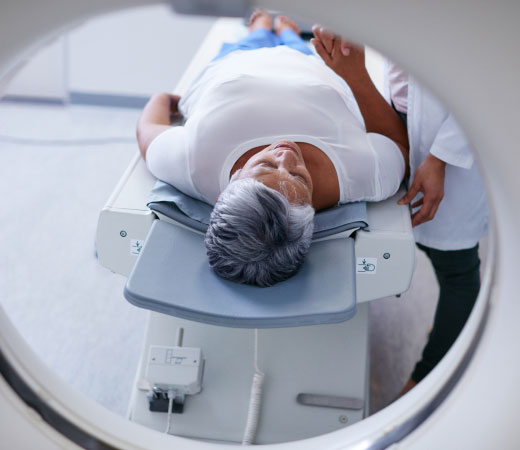
Your first visit will usually include the following steps:
Please bring the following with you to your first appointment (if you have them):
Other things to remember before your first visit:
Other healthcare professionals who may be involved in your care:
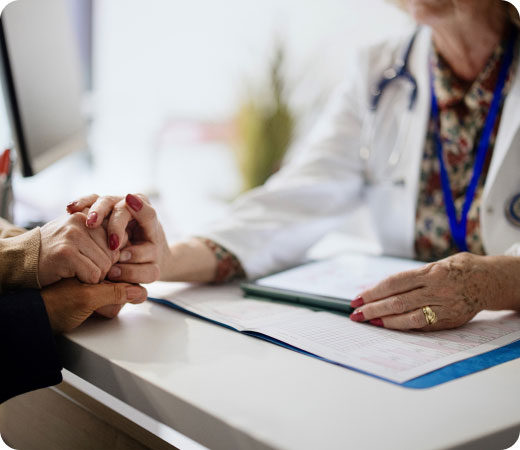
Whether you’re an existing patient receiving treatment here or a returning patient with a new diagnosis, Cleveland Clinic Abu Dhabi is here to assist you on the next steps of your cancer journey. Let us help you determine next steps.
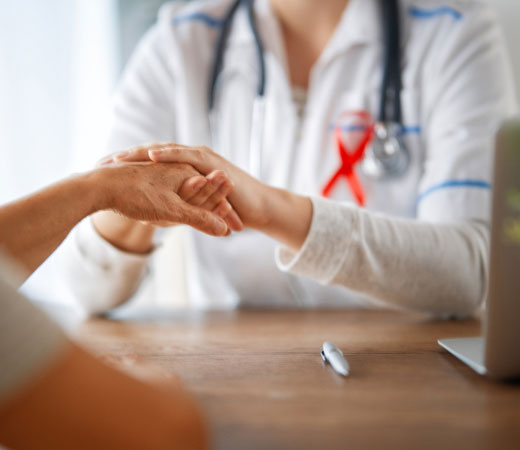
Learning that you have cancer can be an overwhelming experience. As you begin researching what steps to take after receiving a cancer diagnosis, you’ll probably hear a lot about getting a second opinion. Cleveland Clinic Abu Dhabi provides second opinions for people who have been newly diagnosed with cancer, as well as for those who may be further along in their course of treatment.
Our cancer medical experts provide second opinions to review a diagnosis or treatment plan and discuss a variety of treatment options. When you come to us for a second opinion, you don’t have to commit to receiving treatment here.
Click here to book an appointment for a second opinion.
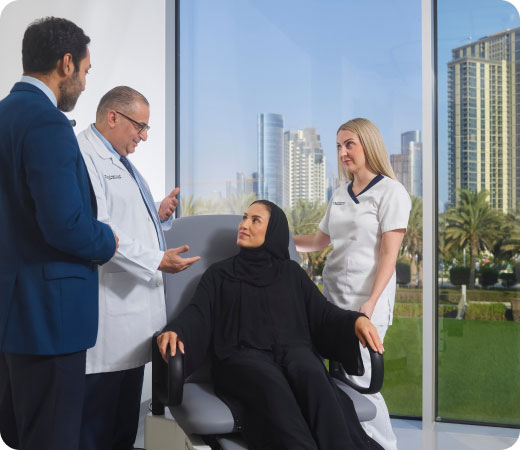
Healthcare is complicated, and so is insurance. You can avoid getting unexpected bills by having authorization from your insurance company before a scan, test or treatment. That is why you may be asked to wait while your insurance company pre-authorizes a last-minute service. While we ask for feedback from your insurance company as soon as possible, reviews may not be immediate.
We understand this can be frustrating and inconvenient, especially for those with a tight travel schedule. However, this important step can influence future coverage decisions by your insurance company. If you have questions about your coverage, speak to the Financial Clearance Center team.

If you or your family member has been diagnosed with cancer, you will face a lot of difficult questions. Where should you go for care? What are your treatment options?
Cleveland Clinic Abu Dhabi has a dedicated team ready to guide you. We will answer your questions and match you with the best doctors and services for your needs.
Our International Patient Services team will coordinate with you or your family, to schedule the services you have requested. There is no referral needed. We can also answer your questions related to finances, health insurance, and medical records.
Further information for international patients can be found here.
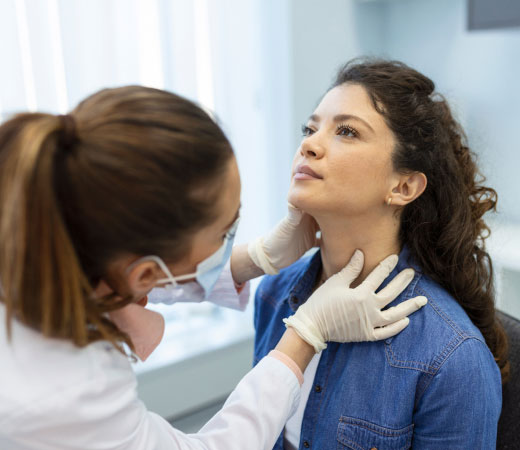
Our dedicated international patients team provides comprehensive services for patients from around the world who come to Cleveland Clinic Abu Dhabi for specialized medical care. We are committed to ensuring that patients with a variety of medical needs receive the care they require as efficiently and comfortably as possible.
To get in touch please call us on +971 2 501 9903 or Request an Appointment online.
Learn more about how we can help you arrange and prepare for your visit, and what to expect throughout your patient journey.
Learn More